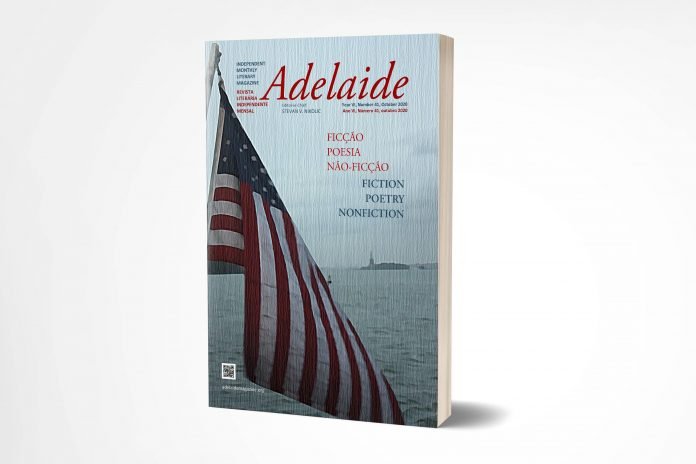Review of The White Field by Douglas Cole
In the first magnetic lines of The White Field by Douglas Cole, the narrator Tom enters a surreal purgatory: “I walked into the sun. It seared the road and the rooftops, intense, blinding.” For Tom, the bright heat greets his release from prison, but not as a mere celebration of freedom. The symbolism forebodes the furnace of his dead-end job in an industrial paint shop.
An accomplished poet with six fine collections, Cole mesmerizes with intoxicating language. Take this passage where Tom digests a jazz refrain:
Chet Baker came on, playing a song called Night Bird, and I listened as he laid down the first few statements, repeated them, and then took flight…. And I went with him and closed my eyes and knew in the dark sky sound I am going and go and boundless go just like that night bird flying with no walls and no doors and no home at all….
Throughout the novel, the music soundtrack adds to the dream-like tapestry, even at Tom’s job which otherwise resembles a vision of Hell. We hear his passion for freedom in his listening, along with echoes of tethers holding him back: the friends and estranged family from his former life before jail and the stigma of being an ex-con.
A visit to his family—his children and remarried wife—is most poignant. His ex-wife invites him to dinner, but she welcomes him with painful restraint. Her husband, though strictly polite, fails to hide his discomfort, emphasizing his contrast with Tom and the life he lost:
I saw him direct a cool look at Carol, which I was sure had formed in the cauldron of conversations they’d had before I came over in which I figured prominently—and not as the hero.
Tom’s son is less restrained, stomping away from the table and decrying Tom’s criminal past and his prolonged absence. When Carol awkwardly attempts to recover the evening, Tom responds with small talk, delving into a childhood incident when his brother pulled a gun on him. His choice of a story more appropriate for the prison mess hall shows how far away he has drifted.
His old friends similarly induce bitter memories and current anguish, utterly realistic. They offer help in the form of temptation and hallucinogenic drugs, augmenting Tom’s disorientation:
…down the quiet hallway with green glow of fuzzy bulb lights and double row of identical doors rippling like jellyfish I moved alone and now in terror of seeing anyone knowing at least in a distant life preserver way my condition and how vulnerable I was…so I slipped spirit-quick outside into the protective night land of tilting streets…
Fitting that Tom feels safe in the night, devoid of human contact and people telling him what he was or was not, and what he should be. Aware of his emotional vulnerability, he tries to balance his desire for companionship with the risk it implies. Released from prison, but is he free? Is he reborn or dead already?
Tom floats through a between-land resounding with moments of transformation and change we can all feel. His attempts to reconnect flow like dreams but press against tangible boundaries. Even his newfound freedom feels like a prison:
I sat up in my bed and realized that I was rising…because I was still on prison time…. But I still had these walls around me, even if they were semipermeable membranes I could slip through at any time. Walls holding you and walls holding you in whisper similar seductive sentences, the womb versus the tomb.
The succinct metaphor of prison as a womb reveals Tom’s unique sense of constriction, as does his feeling that he has emerged into another set of walls. The tethers of family and friends pull him home but also restrict his liberty.
The White Field is finally a road novel, both internal and external. As Tom struggles to test the limits of his freedom, he continues to sift through his past, eventually driving north to find his estranged brother, his father, and his childhood home. With each stop he reenters his personal history at the moment he left, confronting change in himself and others. We join Tom on his journey from prison, and we share his desire to succeed, his mistakes, and his pain of failure, like the phosphorous burn he suffers on his first day at work.
Lyrical and beautifully written, The White Field reads like a series of prose poems, intoxicating and impossible to put down. Each scene and each character we meet is unique yet believable. Freed from prison, Tom’s quest for freedom has just begun.
Terry Tierney’s collection of poetry, The Poet’s Garage, was published by Unsolicited Press in May 2020. His poems and stories have recently appeared in Rust and Moth, Fiction Pool, Typishly, The Mantle, Valparaiso Poetry Review, The Lake and other publications. Lucky Ride (Unsolicited Press), an irreverent Vietnam-era road novel, is set to release in 2021. Terry is a graduate of Binghamton University, and he earned his PhD in Victorian Literature from Emory University. His website is https://terrytierney.com






















